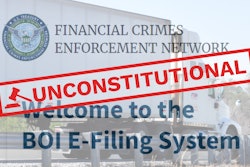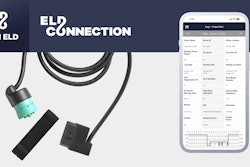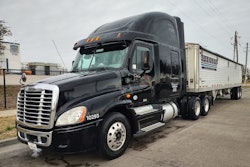Since last week's report on the Ikea v. Convoy interpleader lawsuit, where the mega shipper seeks court judgment on who to pay for freight moved after the digital freight brokerage's stunning collapse, more than a dozen carriers have gotten in touch reporting invoices that remain unpaid by Convoy.
Convoy's demise came without warning. First, loads simply disappeared from the freight platform, but Convoy staff chalked that up to an outage. A day later, Convoy made it official when founder Dan Lewis said a "perfect storm" of bad freight rates and toughening capital markets sunk the enterprise.
Carriers, shippers, and even Convoy's own employees had no idea what happened. Many carriers found out from the news media that the broker they were hauling for had shuttered. Others got an email, with a significant part of it emphasized with bold text:
"As you may have seen in the news," Convoy told carriers in October, "Convoy is involved in a business transition. We understand you are currently delivering a load for us. Rest assured, that you will be paid for this load. Please continue to deliver the shipment to the intended destination, and then submit your BOL through the Convoy app to begin your payment processing. If you have a trailer, please drop that at the intended location as well."

Four and a half months later, a few dozen carriers in the Ikea case, and at least a dozen outside of it, haven't been paid a cent, and nobody knows where to go for payment. One carrier is owed $160,000. Another is owed just $680. For at least two carriers Overdrive spoke to, Convoy's collapse represented the last nail in the coffin.
"Unfortunately Convoy then proceeded shut off all communication, stopped answering their phones, and soon afterwards stopped responding to emails altogether," one jilted carrier told Overdrive. "As a result, due to the current extreme downturn in the trucking industry over the past year, this was the final straw that left little option but to actually suspend our operating authority due to the financial hardship this caused."
Convoy collapsed after failed talks with Hercules Capital, a venture capital bank that had lent the brokerage $100 million in April of 2022, when contract freight rates were setting records. Convoy's loan from Hercules carried with it strict conditions and financial performance metrics that the broker had to hit. Since then, contract and spot rates both have taken a hit, and interest rates have steadily climbed.
Hercules couldn't be reached for comment, but on a recent earnings call, CEO Scott Bluestein said "our monitoring remains enhanced given continued market volatility and uncertainty."
Under that "enhanced monitoring," Convoy didn't make the cut.
Hercules foreclosed on all of Convoy's assets, including its tech and accounts receivable. In weeks immediately following the foreclosure, a core team of Convoy employees stayed on to process payments to carriers and staff, and to wrap up other business. On LinkedIn, some Convoy HR workers show they stayed on until December 2023, two months after the collapse.
[Related: Convoy's collapse: Was the tech worth the hype?]
But Hercules did not pay all the carriers, and shortly after Convoy promised payment to each carrier, it lost its ability to actually administer those payments.
"Our workout efforts with regards to Convoy remain ongoing and our recovery efforts will likely wrap up early this year, although that situation remains ongoing and fluid," Bluestein said on the recent earnings call. Hercules sees its work with Convoy as nearing conclusion, but it has yet to contact any of the unpaid carriers Overdrive spoke to.
Hercules did sell Convoy's biggest asset, the technology platform, to Flexport for an undisclosed amount. The tech sold for around $10 million, give or take, people with inside knowledge of the situation have said. And Flexport only bought the tech, and has no legal obligation to (and won't) pay the carriers even as it promotes Flexport and the new Convoy Platform as driver-friendly and an advocate for drivers.
Those same sources indicate that in final proceedings between Hercules and Convoy, in many cases, Hercules paid a carrier's factoring company, and the carriers need to review their contracts or transactions with those factoring companies to make sure they haven't already been paid.
Ultimately, Hercules can make the call on who to pay with the proceeds of the tech sale. When a company shuts down, records get harder to pull and staff leave, taking institutional knowledge with them. Hercules may not even be aware of the magnitude of the unpaid-carrier problem. Carriers in that situation may seek to contact Hercules over nonpayment issues, though any potential result is uncertain. Likely, Hercules had to carefully navigate how to salvage value out of Convoy, whose hard and other assets did not reach anywhere near a reported $3.8 billion valuation prior to the company's collapse. Convoy's tech, relationships, and branding represent the bulk of its value.
Otherwise, as the Ikea case spelled out, Convoy's carrier agreements forbade carriers from going after the shipper for payment. Yet according to Alexander Winton and Associates, a freight debt collection agency and an interpleader in the Ikea case, carriers can and perhaps should seek payment from shippers.
[Related: How can you get paid when a freight broker goes bust?]
"Our position is that the carriers are legally entitled to pursue the shippers and receivers directly on the loads," wrote Tony Mangini, general counsel for Alexander, Winton & Associates.
Mangini cited AWA's "substantial experience recovering for carriers" both in and outside of litigation as precedent for that view.
Brokers can stick all kinds of language in a carrier agreement, but that doesn't mean it will hold up in court or withstand legal scrutiny generally. Readers will recall there's an open regulatory question surrounding whether brokers can legally make carriers waive their right to broker transparency.
For other shippers like Ikea -- Ford, Home Depot, Nestle, Purina and Chewy have all been named by carriers as owing money on Convoy-brokered loads -- hiding behind Convoy's contract language may not last long in a legal proceeding.
"Generally, agreements between the broker and the carrier are not enforceable by the shippers, as the shippers are not parties to such agreements," wrote Mangini.
And if you do have unpaid invoices from Convoy, whatever you do, hold on to those BOLs.
"In contrast, the bill of lading is a contract that directly connects the carriers and the shippers, allowing recovery," Mangini continued.
For now, Mangini estimates Convoy owed millions to carriers, as his firm "alone has been assigned over $600,000 in unpaid Convoy invoices." So while ultimately, courts will have to decide what money goes where in the wreckage of Convoy's contracts and agreements, the buck may ultimately stop with Hercules, who assumed ownership of Convoy's assets, or the shippers themselves, who may or may not have paid Convoy for loads moved by carriers that went unpaid.
Read next: 'We understand the stress and frustration': Flexport responds to Convoy's unpaid carriers
[Related: Ikea v. Convoy: Lawsuit reveals glimpse at contract rates, broker margins]









